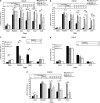Cannabinoid receptor activation prevents the effects of chronic mild stress on emotional learning and LTP in a rat model of depression
- PMID: 24141570
- PMCID: PMC3924526
- DOI: 10.1038/npp.2013.292
Cannabinoid receptor activation prevents the effects of chronic mild stress on emotional learning and LTP in a rat model of depression
Abstract
Most psychiatric disorders are characterized by emotional memory or learning disturbances. Chronic mild stress (CMS) is a common animal model for stress-induced depression. Here we examined whether 3 days of treatment using the CB1/2 receptor agonist WIN55,212-2 could ameliorate the effects of CMS on emotional learning (ie, conditioned avoidance and extinction), long-term potentiation (LTP) in the hippocampal-accumbens pathway, and depression-like symptoms (ie, coping with stress behavior, anhedonia, and weight changes). We also examined whether the ameliorating effects of WIN55,212-2 on behavior and physiology after CMS are mediated by CB1 and glucocorticoid receptors (GRs). Rats were exposed to CMS or handled on days 1-21. The agonist WIN55,212-2 or vehicle were administered on days 19-21 (IP; 0.5 mg/kg) and behavioral and electrophysiological measures were taken on days 23 and 28. The CB1 receptor antagonist AM251 (IP; 0.3 mg/kg) or the GR antagonist RU-38486 (IP; 10 mg/kg) were co-administered with WIN55,212-2. Our results show that CMS significantly modified physiological and behavioral reactions, as observed by the impairment in avoidance extinction and LTP in the hippocampal-accumbens pathway, and the alterations in depression-like symptoms, such as coping with stress behavior, weight gain, and sucrose consumption. The most significant effect observed in this study was that 3 days of WIN55,212-2 administration prevented the CMS-induced alterations in emotional memory (ie, extinction) and plasticity. This effect was mediated by CB1 receptors as the CB1 receptor antagonist AM251 prevented the ameliorating effects of WIN55,212-2 on extinction and LTP. The GR antagonist RU-38486 also prevented the CMS-induced alterations in extinction and plasticity, and when co-administered with WIN55,212-2, the preventive effects after CMS were maintained. The findings suggest that enhancing cannabinoid signaling could represent a novel approach to the treatment of cognitive deficits that accompany stress-related depression.
Figures





Similar articles
-
Cannabinoids ameliorate impairments induced by chronic stress to synaptic plasticity and short-term memory.Neuropsychopharmacology. 2013 Jul;38(8):1521-34. doi: 10.1038/npp.2013.51. Epub 2013 Feb 20. Neuropsychopharmacology. 2013. PMID: 23426383 Free PMC article.
-
Cannabinoids prevent the development of behavioral and endocrine alterations in a rat model of intense stress.Neuropsychopharmacology. 2012 Jan;37(2):456-66. doi: 10.1038/npp.2011.204. Epub 2011 Sep 14. Neuropsychopharmacology. 2012. PMID: 21918506 Free PMC article.
-
Cannabinoid receptor activation in the basolateral amygdala blocks the effects of stress on the conditioning and extinction of inhibitory avoidance.J Neurosci. 2009 Sep 9;29(36):11078-88. doi: 10.1523/JNEUROSCI.1223-09.2009. J Neurosci. 2009. PMID: 19741114 Free PMC article.
-
Cannabinoids prevent the differential long-term effects of exposure to severe stress on hippocampal- and amygdala-dependent memory and plasticity.Hippocampus. 2017 Oct;27(10):1093-1109. doi: 10.1002/hipo.22755. Epub 2017 Jul 14. Hippocampus. 2017. PMID: 28667676
-
Neurobiology of chronic mild stress: parallels to major depression.Neurosci Biobehav Rev. 2012 Oct;36(9):2085-117. doi: 10.1016/j.neubiorev.2012.07.001. Epub 2012 Jul 7. Neurosci Biobehav Rev. 2012. PMID: 22776763 Free PMC article. Review.
Cited by
-
Stress and Fear Extinction.Neuropsychopharmacology. 2016 Jan;41(1):58-79. doi: 10.1038/npp.2015.180. Epub 2015 Jun 24. Neuropsychopharmacology. 2016. PMID: 26105142 Free PMC article. Review.
-
Targeting the Endocannabinoid CB1 Receptor to Treat Body Weight Disorders: A Preclinical and Clinical Review of the Therapeutic Potential of Past and Present CB1 Drugs.Biomolecules. 2020 Jun 4;10(6):855. doi: 10.3390/biom10060855. Biomolecules. 2020. PMID: 32512776 Free PMC article. Review.
-
Solid lipid nanoparticles loading with curcumin and dexanabinol to treat major depressive disorder.Neural Regen Res. 2021 Mar;16(3):537-542. doi: 10.4103/1673-5374.293155. Neural Regen Res. 2021. PMID: 32985484 Free PMC article.
-
Encore: Behavioural animal models of stress, depression and mood disorders.Front Behav Neurosci. 2022 Aug 8;16:931964. doi: 10.3389/fnbeh.2022.931964. eCollection 2022. Front Behav Neurosci. 2022. PMID: 36004305 Free PMC article. Review.
-
Mechanisms to medicines: elucidating neural and molecular substrates of fear extinction to identify novel treatments for anxiety disorders.Br J Pharmacol. 2014 Oct;171(20):4690-718. doi: 10.1111/bph.12779. Epub 2014 Jul 23. Br J Pharmacol. 2014. PMID: 24835117 Free PMC article. Review.
References
-
- Abush H, Akirav I. Cannabinoids modulate hippocampal memory and plasticity. Hippocampus. 2010;20:1126–1138. - PubMed
-
- Ahima R, Harlan R. Charting of type II glucocorticoid receptor-like immunoreactivity in the rat central nervous system. Neuroscience. 1990;39:579–604. - PubMed
-
- Akirav I.2013Cannabinoids and glucocorticoids modulate emotional memory after stress Neurosci Biobehav Rev(e-pub ahead of print). - PubMed
Publication types
MeSH terms
Substances
LinkOut - more resources
Full Text Sources
Other Literature Sources
Medical

